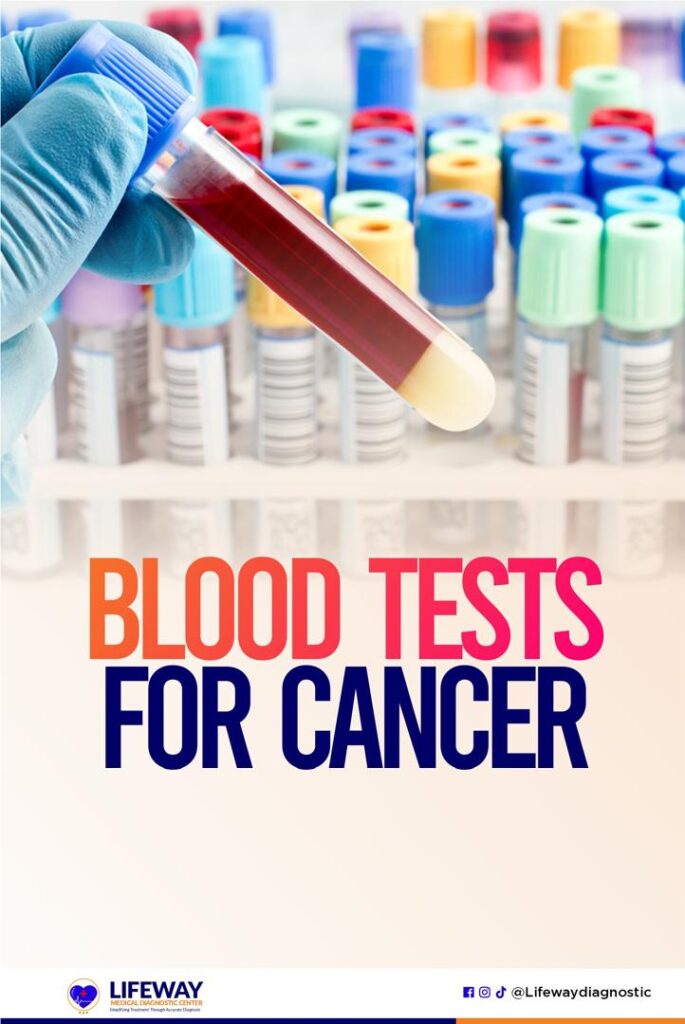Early cancer detection through blood tests can significantly improve prognosis and quality of life. Blood tests for cancer can help identify the presence of cancer before physical symptoms appear, enabling early treatment.

Common cancer symptoms include unexplained weight loss, fatigue, unusual bleeding/bruising, and frequent infections.
If you have risk factors like a family history, discuss getting a cancer blood test with your doctor. These symptoms don’t always mean cancer, but warrant investigation.
In this blog post, we’ll explore the latest developments in blood tests for cancer.
Read: 11 Ways to Keep Your Heart Healthy
What Is Cancer?
Cancer is a complex and often misunderstood disease that occurs when abnormal cells in the body grow uncontrollably.
Abnormal cells can form tumors, invade nearby tissues, and spread throughout the body.
There are many different types of cancer, each with its own unique characteristics and treatment options.
While cancer can be frightening, advances in research and treatment have improved our understanding and management of the disease.
Early detection, healthy lifestyle choices, and regular screenings are key factors in reducing the risk of developing cancer.
How Does One Get Cancer?
Cancer can develop when there are changes in the DNA of our cells, causing them to grow uncontrollably and form tumors.
Genetic predisposition, lifestyle choices, environmental exposures, and certain infections can cause these changes.
Common cancer risk factors include smoking, heavy drinking, poor diet, lack of exercise, and chemical exposure.
Genetics plays a significant role in determining an individual’s susceptibility to cancer, even for those exposed to risk factors.
Read: What Causes Shortness of Breath?
What Are The Different Types Of Cancer?
There are many different types of cancer, each affecting different parts of the body.
Some common types include breast cancer, lung cancer, prostate cancer, and skin cancer.
These types of cancer can have various subtypes and stages, making each case unique in its treatment and prognosis.
Other less common types of cancer include leukemia (a blood cancer), lymphoma (a cancer of the lymphatic system), and sarcoma (a cancer that develops in connective tissues like bone or muscle).
Are There Any Specific Symptoms That Indicate The Need For A Blood Test For Cancer?
Yes, certain symptoms may indicate the need for a blood test to check for cancer.
Common cancer symptoms include unexplained weight loss, fatigue, unusual bleeding/bruising, and frequent infections.
If you have risk factors like a family history, discuss getting a cancer blood test with your doctor. These symptoms don’t always mean cancer, but warrant investigation.
It’s always important to listen to your body and seek medical advice if you have any concerns. Regular check-ups and screenings can help catch any potential issues early on.
How Do Cancer Blood Tests Work?
Cancer blood tests analyze a blood sample to detect biomarkers that may indicate cancer. These include proteins, tumor cells, and DNA fragments.
Advanced techniques like sequencing and PCR identify and measure the biomarkers. Though not diagnostic alone, these tests provide insights to guide treatment.
Also Read: How To Perform CPR (Cardiopulmonary Resuscitation)
Which Blood Tests Are Used To Detect Cancer?
There are several types of blood tests used to detect cancer, each with unique capabilities and applications. Some of the most common include:
1. Tumor Marker Tests: These tests measure the levels of specific proteins or substances that can be elevated in the presence of certain types of cancer, such as prostate-specific antigen (PSA) for prostate cancer or cancer antigen 125 (CA-125) for ovarian cancer.
2. Circulating Tumor Cell (CTC) Tests: These tests detect and analyze cancer cells that have broken away from the primary tumor and are circulating in the bloodstream, providing valuable information about the cancer’s characteristics and potential spread.
3. Cell-Free Tumor DNA (ctDNA) Tests: Also known as liquid biopsies, these tests analyze fragments of genetic material (DNA) that have been shed by cancer cells into the bloodstream, allowing for the detection and monitoring of the disease.
4. Immunoassay Tests: These tests measure the levels of specific antibodies or immune system proteins that may be elevated in response to the presence of cancer, providing an indirect way to detect the disease.
5. Metabolomic Test: Metabolomic tests analyze the levels of various metabolites, which are the byproducts of cellular processes, in the bloodstream.
Certain patterns or changes in these metabolite levels can be indicative of the presence of cancer.
How Accurate Are Blood Tests For Detecting Cancer?
Blood tests can be a valuable tool in detecting cancer, but they are not always 100% accurate.
Different types of cancer may produce different markers in the blood, making it easier to detect some cancers than others.
Additionally, factors like the stage of the cancer and the individual’s overall health can affect the accuracy of blood test results.
It’s important to remember that blood tests are just one part of the diagnostic process for cancer.
They are often used in conjunction with other tests such as imaging scans and biopsies to provide a more comprehensive picture.
Also Read: Cucumber: Nutritional Content and Health Benefits
How Do I Prepare For A Cancer Blood Test?
When preparing for a cancer blood test, there are a few important steps you can take to ensure the accuracy and reliability of the results:
1. Consult with your healthcare provider: Before the test, discuss the specific type of cancer blood test you will be undergoing with your doctor or healthcare provider.
They can provide you with detailed instructions on how to prepare and what to expect during the process.
2. Follow any pre-test instructions: Your healthcare provider may give you specific instructions to follow in the days or weeks leading up to the test.
This may include avoiding certain medications, maintaining a specific diet, or refraining from certain activities. It’s crucial to follow these instructions carefully to ensure the accuracy of the results.
3. Arrive well-hydrated: Drink plenty of water in the days leading up to the test. Being well-hydrated helps ensure your blood is properly diluted, making it easier for healthcare professionals to obtain a sufficient sample.
4. Avoid strenuous exercise: It’s generally recommended to avoid intense physical activity for at least 24 hours before the blood test, as exercise can temporarily affect certain biomarkers in the blood.
5. Communicate any concerns: If you have any concerns or questions about the blood test, be sure to discuss them with your healthcare provider.
They can provide you with the necessary information and guidance to help you feel prepared and comfortable during the process.
Remember, the specific preparation steps may vary depending on the type of cancer blood test you are undergoing.
Can Blood Tests Detect All Types Of Cancer?
Blood tests can be a valuable tool in detecting certain types of cancer, but they are not able to detect all types of cancer.
Blood tests can detect cancer markers like PSA for prostate cancer or CA-125 for ovarian cancer. However, not all cancers produce detectable markers, so blood tests alone may miss some cancer types.
Other screening methods, such as imaging scans and biopsies, may also be necessary to fully assess and diagnose cancer.
What are the risks of getting a blood test for cancer?
Getting a blood test for cancer is generally a safe and routine procedure, but like any medical test, there are some risks to be aware of.
Minor bruising or bleeding at the blood draw site is a potential risk, but this is usually temporary and resolves on its own.
In rare cases, some people may feel lightheaded or dizzy after blood draws, so it’s important to inform the healthcare provider if you have a history of fainting or feeling unwell during medical procedures.
It’s also important to note that while a blood test can provide valuable information about your health, it may not always detect all types of cancer.
False positive or false negative results are possible, which can cause unnecessary anxiety or delay in diagnosis.
It’s always best to discuss any concerns or questions with your healthcare provider before undergoing any medical test to ensure you clearly understand the potential risks and benefits.
Related: Diabetes: Types, Diagnosis, and Prevention
Frequently Asked Questions
The frequency of blood tests for cancer depends on individual risk factors and medical history. It’s best to consult with your healthcare provider to determine an appropriate screening schedule.
The specific test being conducted and the laboratory processing the sample determine the turnaround time for receiving results from a blood test for cancer.
Certain lifestyle factors such as smoking, diet, and exercise habits can influence the likelihood of developing certain types of cancers, which may also affect the results of a blood test.
Conclusion
Blood tests for cancer play a crucial role in early detection and disease monitoring.
These tests offer a non-invasive and convenient way to screen for various types of cancer, providing valuable information that can guide treatment decisions.
While they are not 100% accurate, they are useful in combination with other diagnostic methods.
Recommendations
- EEG (Electroencephalogram); All You Need To Know
- Where to get a CT Scan near me
- Spirometry: Understanding and Preparation
- Why Choose Lifeway Medical Diagnostic Center?
- Lifeway Diagnostic Ambulance Service
References
- mayoclinic.org– Cancer blood tests: Lab tests used in cancer diagnosis
- my.clevelandclinic.org-Blood Tests for Cancer
